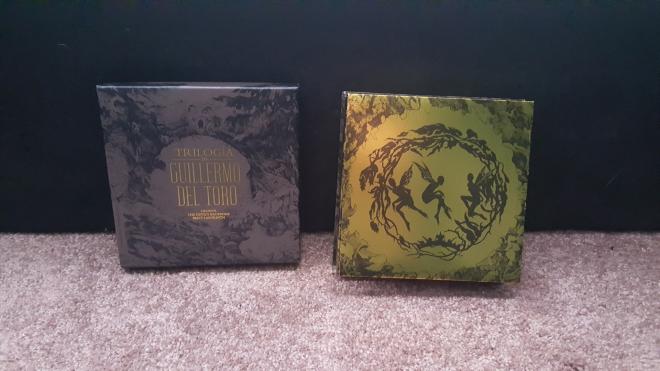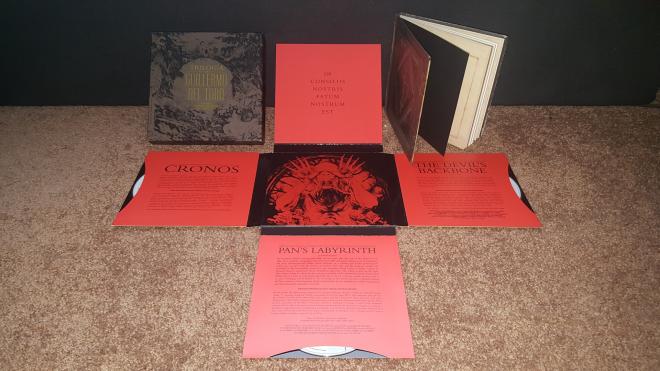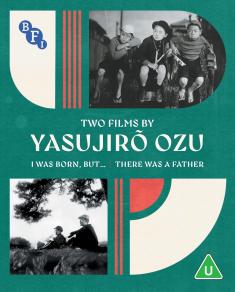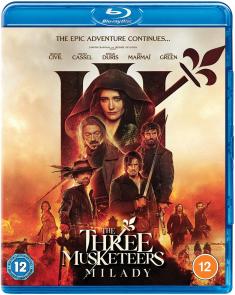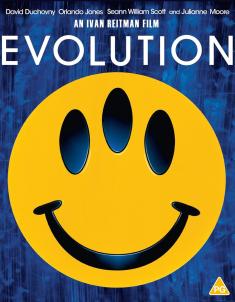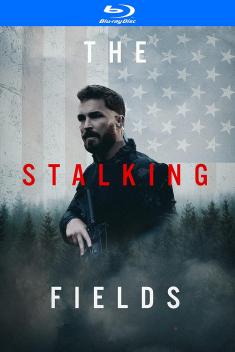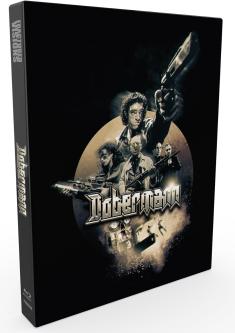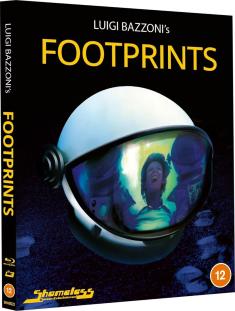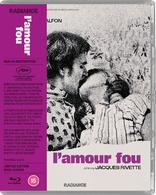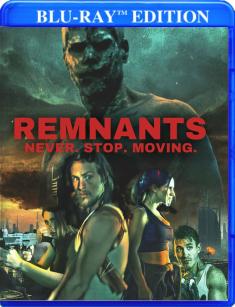Trilogía de Guillermo del Toro
Overview -
Throughout a career that encompasses both visually arresting art-house hits and big-budget Hollywood spectacles, director Guillermo del Toro has continually redefined and elevated the horror genre with his deeply personal explorations of myths and monsters. These three Spanish-language films, each a tale of childhood in troubled times, showcase his singular fusion of the fantastic and the real. Drawing inspiration from a rich variety of sources, from Alfred Hitchcock to Francisco de Goya, the gothic-infused stories collected here—populated by vampires, ghosts, and a fairy-tale princess—make evident why del Toro is considered the master cinematic fabulist of our time.
Collector's Set includes: Chronos, The Devil's Backbone, and Pan's Labyrinth
Storyline: Our Reviewer's Take
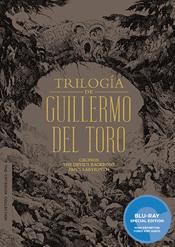
Cronos
Years before letting loose the twisted, phantasmal grotesqueries lurking in the dark shadows of his dreams, Guillermo del Toro fed moviegoers with a small morsel of his morbid, macabre imagination in 'Cronos.' Many of the same themes he later explores with a deeper inquiry are touched upon in this quiet, quaint tale of aging antique dealer Jesús Gris unearthing a bizarre, scarab-shaped device with the secret for eternal life. At first, his fortuitous discovery is a blessing, rejuvenating a zest for life he hadn't experienced since his youth. However, his presumed godsend comes at a terrible price and brings out the worst in those who desire it's dark, unnatural gift. Played by the outstanding Argentinean actor Federico Luppi, Jesús is a peaceful, sweet-tempered man who appears content with his life. And as a loving grandfather to the inquisitive but mysteriously silent Aurora (Tamara Shanath), we see little fault in Jesús, and we come to really like this saintly man. As the story evolves, the character comes to embody everything his name implies: a complicated Christ figure walking on gray moral grounds.
On the surface, this is a familiar vampire story where the newly-transformed vamp uncovers a strange, foreign reality while battling a perverse, fiendish hunger for blood. But in the hands of del Toro, making his writing and directing debut, the familiar feels fresh and new, as he slowly peels away at Jesús's innocence to unveil a world that can't be judged simply in black and white terms. Granted, Claudio Brook ('License to Kill,' 'Revenge') plays Dieter de la Guardia as the film's decidedly villainous business tycoon who will stop at nothing to possess the device and prevent his death. But as his name would suggest — it means warrior or guardian of the people — the character is bit more complicated. Although he's largely driven by greed and an envious lust for youth with a wrathful temperament, Dieter reveals a common fear we all share: a fear of death. His nephew Angel, played terrifically by Ron Perlman, also comes with a suggestive name, but more importantly, he's a stereotypical henchman who lusts for wealth, awaiting his uncle's death for the inheritance, and proudly feeds his vanity through plastic surgery.
In 'Cronos,' the bad guys are capable of some loathsome, vile actions for satisfying their appetites, but they also come with an evident weakness and vulnerability. While Dieter is physically fragile and withering away due to an undisclosed disease, the thuggish Angel is a powerlessness man-child. We end up pitying them on some small level rather than outright hating them because we understand their immorality grows from a frailty we're all familiar with. Jesús's dark gift awakens him to this morally-grey conflict while internally wrestling with newly discovered sinful desires. His renewed vitality for life slowly reveals deeply hidden urges that should never surface let alone be acted upon, such as the sickening propensity for lapping blood off the floor of a men's restroom. As an introduction to del Toro's world of horror, 'Cronos' is a journey of salvation mixing genre archetypes with religious allegories and various elements of well-known fairy tales. And for our reluctant Christ-like hero, his journey is littered with moral ambiguity where audiences cheer for good triumphing over evil, but nonetheless pity the wicked and fear the possibility of their winning in the end. (Movie Review: 4/5)
The Devil's Backbone
In Guillermo del Toro's 'The Devil's Backbone,' a series of unfortunate events take shape inside a small orphanage for boys, exposing them to the cruel realities of the world and forcing them into adulthood far sooner than they're prepared for. Already having to deal with issues of abandonment, the boys are also burdened with knowing the brutality some people are capable of inflicting upon others. This seems particularly true of Jaime (Íñigo Garcés), a kid expressing his anger and frustration with the world by bullying others, namely the new kid Carlos (Fernando Tielve). Written by del Toro, Antonio Trashorras and David Muñoz, the plot is essentially a tale of the corruption of innocence, of a harsh world infecting the purity of a child, turning him into an uncaring cynic. At first, it doesn't seem like Jacinto (Eduardo Noriega), the groundskeeper, is much more than the story's antagonist, your standard villain whose devious scheming pushes the narrative forward. However, his role is quite significant when he later divulges to the pretty Conchita (Irene Visedo) his hatred for the orphanage because it's where he grew up.
Jacinto is an unpleasant individual. A brutish and callous bully the boys rightfully fear, the man is full of unresolved anger and resentment, which he lets out in a sadistically malicious attitude towards the kids. It won't be until the third act that we learn a bit more about Jacinto — a very brief moment of humanity when he discovers a box of childhood pictures, like souvenirs of a period of his own lost innocence. It's in light of this we too discover a thoughtful, penetrating design to del Toro's ghostly tale. The beautiful but subtly complex plot is set in the final year of the Spanish Civil War in its final year when sadly, the fascist right-wing dictator Francisco Franco was destined to rule for the next four decades. The idea of innocence lost suddenly expands into other facets of the film, as the inhabitants of this nearly-abandoned orphanage are made to battle amongst themselves. While the relatively young Jacinto is driven by greed and wealth, the older couple operating the school try to remain vigilant to their ideals and the pursuit of caring for these unfortunate children.
Carmen (Marisa Paredes) is the main administrator worn thin by the endless struggle to keep the orphanage functioning, but the Dr. Casares (Federico Luppi) persists as the hopeful idealist wanting to set the boys on their proper path into adulthood. And lest I forget to mention it, mainly because I'm carried away by the plot's more profound and astute implications, 'The Devil's Backbone' is on its surface an excellent ghost story surrounding the mysterious death of one orphan boy named Santi (Junio Valverde). It's a creepily atmospheric tale told in the traditional style of the Gothic horror, a literary off-shoot of the Romantic genre where audiences take enjoyment in being immersed in dread and terror over cheap, sudden jump scares. Del Toro delights in the visually dramatic and disturbing environments, an approach that harkens back to classic Hammer Films, Jack Clayton's 'The Innocents' and Lewis Allen's 'The Uninvited.' (Movie Review: 4.5/5)
Pan's Labyrinth
In 'Pan's Labyrinth,' ten-year-old Ofelia, played by the highly talented Ivana Baquero, escapes the cruelty and inhumanity of the real world in favor of fantasy and fairy tales. She's an incredibly caring and sensitive girl who finds comfort and solace in the reverie of her imagination, inventing whimsical adventures fraught with danger about heroism, self-sacrifice and the virtue of innocence. The adults in her life have long ago abandoned such childhood games, going so far as to call such stories immature foolishness and a frivolous waste. Her new stepfather Captain Vidal, a terrifyingly convincing Sergi López, is a cold-hearted leader so stern and austere in his fascist conservative view of the world as it is and should be that it's difficult to imagine he was ever an inventive child. Her doting pregnant mother Carmen (Ariadna Gil) can only encourage her daughter's imagination for so long that it eventually feels more like tolerating than supportive. The captain's housekeeper with a dangerous secret Mercedes (a wonderful Maribel Verdú) is sympathetic to Ofelia's fanciful games, but she, too, confesses having to forsake such whims in order to survive the real world.
Set against the backdrop of the Spanish Civil War, del Toro brings his recurring "loss of innocence" theme full circle with a darkly somber but dismally macabre fairy tale about a little girl caught between two worlds. And part of the film's beauty and intelligence is its creator allowing his audience to decide which of those contrasting worlds we're actually talking about. On the one hand, we have the cold, hard reality of when totalitarian dictator Francisco Franco was to reign for the next three decades battling with the more hospitable and colorful escapism of fantasy where anything is possible. And on the other hand, del Toro's script is the archetypal coming-of-age story when a child reaches a certain age and internally struggles with adopting the world's less fanciful challenges. More importantly, the women in Ofelia's life have surrendered to the cold brutality and sometimes hellish savagery of reality. Her mother's quiet submission to a callous, stony-hearted husband is justified as the only way to survive, and her only friend Mercedes endures a vicious employer with bowed compliance while concealing her true self and a mourning sadness for her childhood innocence.
On a larger, overreaching theme, del Toro explores how much the real world influences and even fuels the imagination. Ofelia's fantasy of possibly being the reincarnated Princess Moanna of the underworld is inhabited by dark, shocking creatures whose intentions are never strictly black or white. Creepily portrayed by Doug Jones, Pan's terrifying appearance is only skin deep, but like Mercedes and the pitiable Dr. Ferreiro (Álex Angulo), time reveals the forest beast is an ally who touches on the plot's subject of blind obedience and the virtue of skepticism. Similar to the captain's brutish trampling of a child's creativity, the Pale Man (also played by Jones) comes with a sadistic appetite for the soul of children while using a bountiful feast to lure the innocent. And the Mexican director ingeniously employs various folk tale motifs for articulating these ideas and brilliantly capturing the imagination of his audience. From the obvious allusions of Lewis Carroll's Alice in Wonderland books and the works of Jorge Luis Borges to subtler references of the Brothers Grimm (instead of a wicked stepmother, we have a wicked stepfather) and Guillermo Navarro's photography taking inspiration from Francisco Goya's paintings, 'Pan's Labyrinth' is one of the most poignantly haunting fantasy tales of our time. (Movie Review: 5/5)
The Blu-ray: Vital Disc Stats
This Blu-ray edition of 'Trilogía de Guillermo del Toro' comes courtesy of The Criterion Collection without a designated spine. All three Region A locked, BD50 discs are housed inside a beautifully decorated box set that opens much like a gift with a gatefold package inside.
With the pages opening from the center into the shape of a cross, three of the sleeves contain a Blu-ray of the separate films. The packaging includes an attractive 100-page hardcopy book with director's notes, production sketches and other artwork. It also features a new introduction by Neil Gaiman and three insightful essays by film critics Maitland McDonagh ("Beautiful Dark Things"), Mark Kermode ("The Past Is Never Dead") and Michael Atkinson ("The Heart of the Maze").
At startup of each disc, there are no trailers before being greeted by the standard menu options and an animated screen. Fans can also purchase all three films as standalone releases: 'Cronos,' 'The Devil's Backbone' and 'Pan's Labyrinth.'
Video Review

Cronos
Del Toro's directorial debut arrives with the same 1080p/AVC MPEG-4 encode, which was created from a 2K resolution scan of the original 35mm camera negative. Although the results may not compare with some of the better titles available, the transfer is a massive improvement over previous home video editions. The video is admittedly on the softer side of things, but overall definition is strong with plenty of visible textures in the clothing and sharp detailing in the antique furniture cluttering Jesús's store. Flesh tones appear natural and revealing. The 1.78:1 image displays well-balanced contrast and brightness although black levels tend to be a bit on the flat side. Nevertheless, shadow details are excellent and the picture comes with appreciable depth. Colors benefit the most with primaries, particularly reds and blues, looking more vibrant than ever before, making this the best the film has ever looked. (Video Review: 4/5)
The Devil's Backbone
Side to side comparisons reveal this AVC-encoded transfer, created from a 2K resolution scan of the original 35mm camera negative, is the same as the 2013 release. The end result remains a splendid high-def presentation, showing spot-on contrast with clean, crisp whites, especially in the ghostly face of Santi. The video also displays a wonderful palette of vibrant greens, steely blues and pulsating reds while accurately-rendered secondary hues provide plenty of warmth and life. Although black levels are rich and opulent for a majority of the film's runtime, shadows occasionally engulf minor background details in several scenes.
Presented in its original 1.85:1 aspect ratio, the image is awash in a very fine layer of natural grain, giving it a beautiful film-like appeal. The smallest crack and imperfection on the walls of the orphanage are plainly visible, and facial complexions are highly revealing and lifelike, exposing every pore, wrinkle and cut on the faces of the cast. (Video Review: 4.5/5)
Pan's Labyrinth
For del Toro's darkly twisted fairy tale into the world of Criterion, producers have culled this wonderful 1080p/AVC MPEG-4 encode from an already available 2K digital intermediate, which was decided to be a faithful representation of the filmmakers' original vision. The accompanying booklet further explains that adjustments were made to the colors in accordance with that vision, but there is no mention of either the director or cinematographer Guillermo Navarro approving or supervising these changes. In either case, the results are excellent.
Compared to the 2007 release, the presentation largely appears identical, but I would probably give the Criterion version the edge and preferred method of watching in the future. Definition and clarity are outstanding, exposing every nook and cranny of the Captain's depressingly austere home. Every fiber and thread in the clothing is sharp, and natural, lifelike complexions are revealing. As mentioned, the palette arrives with a rich and bold array of colors that, on a few occasions, seem slightly oversaturated. However, none of this distracts from the film's enjoyment or ruin the intentionally gloomy photography's steely blue overcast and striking crimson reds of blood. Spot-on contrast maintains superb visibility of background info, and intense blacks penetrate into the screen, providing the 1.85:1 image with appreciable film-like depth without sacrificing the smallest details in the darkest shadows. (Video Review: 4.5/5)
Audio Review

Cronos
As would be expected, del Toro's first feature takes a second bite of Blu-ray with the same Spanish DTS-HD MA stereo soundtrack, which was created from a 35mm magnetic track. The design isn't particularly memorable or noteworthy, but this is the best it has ever sounded and remains true to the filmmakers' intentions. The focus is primarily on the dialogue and character interactions, which come through cleanly and crystal clear from beginning to end. Much of the activity also takes place in the center of the screen, but some of the background noise bleeds off-screen with great effectiveness, generating an amusingly broad and welcoming soundstage. The mid-range doesn't extend far into the upper ranges and can, at times, feel limited, which is related to the quality of the original recording than a fault in the codec. Low bass also doesn't dig very deep, but it's adequate and accurate with appreciable response. Javier Alvarez's score benefits the most, exhibiting excellent distinction and separation. (Audio Review: 3.5/5)
The Devil's Backbone
The video is accompanied by the same Spanish DTS-HD Master Audio soundtrack, which was remastered from the original 35mm 6-channel magnetic track. The original design is not the sort that'll immerse listeners with a spine-chilling environment. However, the subtle arrangement of haunting, evocative sounds heard in the distance remains effectively creepy, generating an ominous and uncanny atmosphere with discreet ambient effects occasionally employed. The rest of the lossless mix is a front-heavy presentation with good, clear vocals in the center, though they can be mumbled and unintelligible at times. Channel separation is very well-balanced, exhibiting precise, well-defined dynamics and acoustical details with clean distinction in the upper ranges. Low bass is surprisingly deep and palpable, adding to the film's eerie feeling and making this high-rez track a marvelous listen. (Audio Review: 4/5)
Pan's Labyrinth
Although Criterion offers two surround sound options for listeners, which were remastered from the original digital audio files, the DTS-HD Master Audio soundtrack is ultimately the same one heard on the 2007 release. Showing little difference between them, the only noticeable improvement is a slightly cleaner dynamic range, exhibiting room-penetrating clarity and marvelous acoustical details. Every bated breath, every ringing burst of a fired bullet, every footstep echoing in stone hallways and large rooms, and every splintering crack in the bones of Pan or the Pale Man can be distinctly heard with outstanding clarity and realism. The low-end delivers an authoritative, floor rumbling shockwave that reverberates all around and even digs into the lower depths on a couple occasions. The rears are almost continuously active with various effects discretely moving from one side of the room to the other, creating a wonderfully immersive 360° soundfield that will haunt viewers' imagination. Amid all the nightmarish chaos and stunning visuals, vocals remain consistently prioritized and intelligible, giving us a reference quality lossless mix that'll put contemporary action flicks to shame. (Audio Review: 5/5)
Special Features

Cronos
- Audio Commentaries — A pair of commentaries commences with writer and director Guillermo del Toro's insightful thoughts on the production's technical aspect and the plot's various themes while sharing a wealth of memories from the set. The second track unites producers Arthur H. Gorson, Bertha Navarro and Alejandro Springall for a pleasing enough conversation on the stage design, casting and performances, various production tidbits and thoughts on the film's history and reception over the years.
- Geometría (HD, 6 min) — A short film by the director, which he started in 1987 but didn't complete until decades later, about a boy wishing to avoid a math test. It's immediately followed by an interview with del Toro reflecting on it (HD, 7 min).
- Welcome to the Bleak House (HD, 10 min) — The Mexican filmmaker takes guests on a guided tour of his home and his personal collection of oddities.
- Interviews (HD) — A set four interviews discuss the film and its impact, starting from the technical aspect of the production with del Toro (18 min) and cinematographer Guillermo Navarro (13 min). The last two feature actors Ron Perlman (7 min) and Frederico Luppi (1080i/60, 5 min) reminiscing on their time with the director and other cast members.
- Photo Gallery (HD)
- Trailer (1080i/60)
The Devil's Backbone
- Audio Commentary — Writer and director Guillermo del Toro rides solo for this commentary track where he explains a great deal about the production, the cast and shooting locations. It's a nice and very informative conversation, as the filmmaker touches on some terrific details about the cinematography, design and Santi's overall appearance, but much, if not all, of the information is also covered in other supplements.
- Introduction (1080i/60, 1 min) — A few, very brief words from the director recorded in 2010.
- Que es un fantasma? (1080i/60, 27 min) — A short documentary by director Javier Soto focused on the film's making, featuring a large variety of interviews and BTS footage.
- Spanish Gothic (1080i/60, 18 min) — Another interview with del Toro talking about the story's origins, themes, shooting locations and how brought it into fruition.
- Summoning Spirits (HD, 14 min) — A recently recorded interview by Criterion with del Toro discussing the look and special effects work that went into the creation of Santi.
- A War of Values (HD, 14 min) — Recorded in 2013 exclusively for this Criterion edition, a very intriguing interview with historian Sebastian Faber talking about the Spanish Civil War and its role in del Toro's film while sharing his own critical analysis.
- Designing The Devil's Backbone (HD, 12 min) — Recently recorded interview by Criterion with the director now discussing his appreciated collaboration with others in the production team.
- Sketch, Storyboard, Screen (1080i/60, 12 min) — Featurette comparing six scenes, from del Toro's original sketches to Carlos Gimenez's storyboards and the completed film.
- Director's Notebook (1080i/60, 12 min) — The interactive featurette shows del Toro's pre-production sketches and concept art, some of which also come attached to various short video clips that are amusing.
- Deleted Scenes (1080i/60)
- Trailer (HD)
Pan's Labyrinth
- Audio Commentary — Ported over from the 2007 Blu-ray release, writer and director Guillermo del Toro talks extensively about the production, from the story's origins and development to cast performances and the film's overall look. As an engaging storyteller, he maintains the technical aspects and creative choices interesting while also sharing his thoughts on the stage design and photography complementing the story's atmosphere and themes.
- Director's Introduction (1080i/60, 1 min) — A brief prologue from the creator setting the mood for the film.
- Del Toro and Funke (HD, 40 min) — A brand-new interview shot recently with the Mexican director shows him talking with German author Cornelia Funke. The two discuss the value and importance of fairy tales in our everyday lives and how we choose to understand them while also touching on their influences in del Toro's films.
- Pan and the Fairies (1080i/60, 31 min) — An insightful look at the makeup, practical and CG effects with awesome BTS footage of Doug Jones in character.
- Doug Jones (HD, 26 min) — Filmed exclusively for this Criterion release, the actor talks extensively about working with del Toro and getting into character. The piece also includes archival footage of Jones preparing into the costumes.
- The Power of Myth (1080i/60, 15 min) — A charming examination of the film's fairy tale aspects while pointing out the various inspirations behind the script and creatures.
- Video Comparisons (1080i/60, 6 min) — Essentially a storyboard comparison of three key scenes showing del Toro's original sketches compared to the storyboard art and the finalized sequences.
- The Melody Echoes the Fairy Tale (1080i/60, 5 min) — Del Toro shares his thoughts on Javier Navarrete's brilliantly haunting score.
- The Color and the Shape (1080i/60, 4 min) — A much too brief discussion on Guillermo Navarro's cinematography and the use of colors for atmosphere and mood.
- Prequel Comics (1080i/60, 4 min) — Origin stories of the faun, the fairies, the Giant Toad and the Pale Man told as motion-comics, which are disappointingly short but interesting nonetheless.
- Director's Notebook (1080i/60, 6 min) — An interactive featurette with highlight icons that take viewers to brief pieces about various aspects of the production.
- Ivana Baquero Audition (1080i/60, 3 min) — Archival footage of the actress filmed in April 2005, demonstrating a talent beyond her years.
- Trailers (1080i/60) — Two theatrical previews are joined by seven TV spots.
Final Thoughts

Mexican filmmaker Guillermo del Toro made his writing and directorial debut with the vampire drama 'Cronos,' followed some years later by the excellent supernatural film 'The Devil's Backbone.' To many, including myself, the dark, macabre fairy tale of 'Pan's Labyrinth' is his magnum opus, seamlessly blending together the twisted ghouls of his imagination with elements of fantasy and his fondness with stories about the loss of innocence. The Criterion Collection brings all three films together inside a beautiful box set with a hardcover book. The first two Blu-ray discs contain the same excellent audio and video presentations from previous releases, but the third features a wonderful, near-reference quality presentation of 'Pan's Labyrinth.' With a wealth of supplements for fans to sift through, the overall package is a must-own for del Toro fans and cinephiles everywhere.
